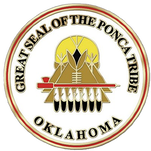Ponca Tribe of Indians of Oklahoma
TRANSPORTATION PROGRAM
Mission Statement and Objectives:
This will be accomplished, in part, by developing the capacity to effectively perform and manage transportation related functions, and ensuring that the Ponca Tribe of Oklahoma becomes and is an essential component of the transportation community, assessing future Tribal capacity and resource needs. Our roadway and river routes used today are in the same location as the ancient Tribal routes which the Ponca people depended on for survival and other Tribal activities. That connection will benefit our understanding between the past, present, and future of Tribal transportation. Planning will aid our Tribal leaders to make informed transportation decisions that will enrich Tribal lands and provide opportunities for current and future generations.
Short-term objectives:
1.PTTP staff will be sent through Occupational Safety and Health Administration training - training in the use of the GIS system, and training in the use and maintenance of heavy equipment.
2. Advocate for consistent and timely obligations of federal funds from the BIA so projects can be advanced in a timely manner. Funds should be received in the first quarter, not the 3rd or 4th.
3. Be more active with the Regional Technical Training Assistance Program, specifically in the areas of new legal requirements for Tribes.
4. Better coordination between the Ponca Tribe and outside agencies, including State Liaison, Oklahoma Department of Transportation, Kay and Noble County, and the BIA. A Memorandum of Understanding (MOU) to meet quarterly to discuss upcoming projects, on or near Ponca Jurisdiction.
5. Support and advocate for a active and comprehensive Tribal Employee Rights Ordinance(TERO),that will not just be used as a taxing mechanism, but will provide training, contract projects with Tribal citizens, combat unemployment in Ponca Jurisdiction by putting people to work in the most diversified way possible.
6. Be active and participate in meetings of the Oklahoma Tribal Transportation Council, a catalyst for change.
Long-term Objectives:
1.The Safe, Accountable, Flexible, Efficient Transportation Equity Act for the 21st Century, (SAFETEA-LU) provides for direct funding agreements between Tribes and the Federal Highway Administration,(FHWA). Through such agreements the Ponca Tribe can replace the current BIA Roads Inventory with one that is predictable, consistent, and uniformly applied. For example, as recently as 2007, States were getting 5,000 per mile for construction, while Tribes were getting 800 per mile.
2. In the future, the PTTP Long Range Transportation Plan will participate in Land use planning,Historic Preservation, Cultural Resources, Archaeology, and Community and Economic Development.3. Through P.L. 93-638,PTTP staff will receive training in contracting and management, rural planning, road construction, and maintenance, NEPA requirements, environmental assessments, transit operations, etc.
4. Hire professional and technical staff including Civil Engineers and planners to accomplish all these objectives.
- to continually assess the current roadway system and identify how the system should be improved
- to accommodate existing and future traffic
This will be accomplished, in part, by developing the capacity to effectively perform and manage transportation related functions, and ensuring that the Ponca Tribe of Oklahoma becomes and is an essential component of the transportation community, assessing future Tribal capacity and resource needs. Our roadway and river routes used today are in the same location as the ancient Tribal routes which the Ponca people depended on for survival and other Tribal activities. That connection will benefit our understanding between the past, present, and future of Tribal transportation. Planning will aid our Tribal leaders to make informed transportation decisions that will enrich Tribal lands and provide opportunities for current and future generations.
Short-term objectives:
1.PTTP staff will be sent through Occupational Safety and Health Administration training - training in the use of the GIS system, and training in the use and maintenance of heavy equipment.
2. Advocate for consistent and timely obligations of federal funds from the BIA so projects can be advanced in a timely manner. Funds should be received in the first quarter, not the 3rd or 4th.
3. Be more active with the Regional Technical Training Assistance Program, specifically in the areas of new legal requirements for Tribes.
4. Better coordination between the Ponca Tribe and outside agencies, including State Liaison, Oklahoma Department of Transportation, Kay and Noble County, and the BIA. A Memorandum of Understanding (MOU) to meet quarterly to discuss upcoming projects, on or near Ponca Jurisdiction.
5. Support and advocate for a active and comprehensive Tribal Employee Rights Ordinance(TERO),that will not just be used as a taxing mechanism, but will provide training, contract projects with Tribal citizens, combat unemployment in Ponca Jurisdiction by putting people to work in the most diversified way possible.
6. Be active and participate in meetings of the Oklahoma Tribal Transportation Council, a catalyst for change.
Long-term Objectives:
1.The Safe, Accountable, Flexible, Efficient Transportation Equity Act for the 21st Century, (SAFETEA-LU) provides for direct funding agreements between Tribes and the Federal Highway Administration,(FHWA). Through such agreements the Ponca Tribe can replace the current BIA Roads Inventory with one that is predictable, consistent, and uniformly applied. For example, as recently as 2007, States were getting 5,000 per mile for construction, while Tribes were getting 800 per mile.
2. In the future, the PTTP Long Range Transportation Plan will participate in Land use planning,Historic Preservation, Cultural Resources, Archaeology, and Community and Economic Development.3. Through P.L. 93-638,PTTP staff will receive training in contracting and management, rural planning, road construction, and maintenance, NEPA requirements, environmental assessments, transit operations, etc.
4. Hire professional and technical staff including Civil Engineers and planners to accomplish all these objectives.
